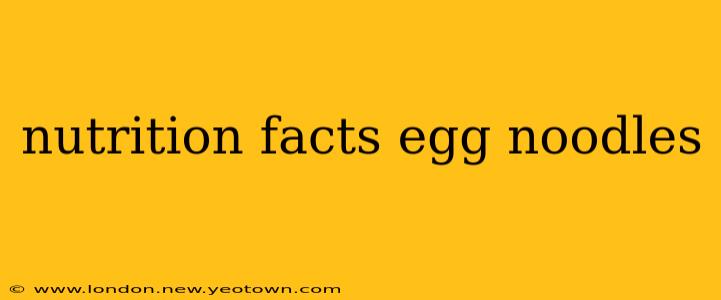Egg noodles, those delightfully chewy and versatile pasta strands, grace countless dishes worldwide. But beyond their culinary appeal lies a nutritional profile that's worth exploring. This isn't just about calories; it's about understanding the vitamins, minerals, and potential health impacts nestled within each serving. Let's embark on a delicious journey to uncover the nutritional facts of egg noodles.
What are the basic nutritional facts of egg noodles?
A typical serving of cooked egg noodles (about 1 cup) generally provides a moderate amount of calories, primarily from carbohydrates. The exact numbers fluctuate depending on factors like the brand, ingredients used (enriched flour, whole wheat variations), and the addition of fats or other ingredients during preparation. However, you can generally expect a serving to contain:
- Carbohydrates: This is the primary macronutrient, providing energy.
- Protein: Egg noodles offer a modest amount of protein, thanks to the addition of eggs during production.
- Fat: The fat content is relatively low in plain egg noodles, but this can increase if you add butter, oil, or creamy sauces.
- Fiber: Unless you opt for whole wheat egg noodles, the fiber content will be relatively low.
- Vitamins and Minerals: Egg noodles often contain added vitamins and minerals like iron and B vitamins due to enrichment processes.
It's crucial to check the specific nutrition label of the brand you're using for the most precise information. Nutritional values vary significantly across brands and types of egg noodles.
Are egg noodles healthy?
The "healthiness" of egg noodles, like most foods, depends on context. Plain egg noodles, eaten in moderation as part of a balanced diet, aren't inherently unhealthy. They provide carbohydrates for energy. However, relying solely on refined-flour egg noodles could lead to a diet lacking in fiber and other essential nutrients.
Choosing whole wheat egg noodles significantly boosts the fiber content, contributing to better digestion and satiety. Furthermore, how you prepare and serve the noodles greatly influences their overall health impact. A simple dish with vegetables and lean protein is far healthier than a serving smothered in creamy, high-fat sauces.
How many calories are in egg noodles?
The calorie count per serving of cooked egg noodles typically falls between 180-220 calories, but this is a broad range. The specific calorie content is affected by the serving size, type of noodle (enriched vs. whole wheat), and any added ingredients. Always consult the nutrition facts panel on the packaging for the most accurate calorie information for your chosen brand.
What are the benefits of eating egg noodles?
While not a nutritional powerhouse, egg noodles offer some benefits:
- Energy Source: They provide carbohydrates, a crucial source of energy for your body.
- Protein Source (Moderate): The addition of eggs contributes to the protein content, essential for building and repairing tissues.
- Convenience and Versatility: Egg noodles are a quick and easy-to-prepare staple, lending themselves to countless culinary creations.
Are egg noodles gluten-free?
No, traditional egg noodles are not gluten-free. They are made from wheat flour, which contains gluten. Individuals with celiac disease or gluten intolerance must avoid them. However, gluten-free egg noodle alternatives are available, often made from rice flour, corn flour, or other gluten-free flours. Always carefully check the ingredient list to ensure the product is certified gluten-free if you have dietary restrictions.
What are the downsides of eating egg noodles?
The potential downsides of egg noodles primarily relate to their nutritional profile:
- Low Fiber (in refined versions): Refined egg noodles lack fiber, which can contribute to digestive issues and potentially impact blood sugar control.
- Refined Carbohydrates: The refined carbohydrates in many egg noodles can lead to energy spikes and crashes.
- Potential for Added Sugars and Sodium: Some brands may add sugars or excessive sodium, negatively impacting health.
Can egg noodles be part of a healthy diet?
Absolutely! Egg noodles can be a part of a balanced and healthy diet, provided you are mindful of portion sizes and the way you prepare them. Opting for whole wheat versions significantly enhances their nutritional profile. Pair them with plenty of vegetables, lean protein sources, and avoid heavy sauces to maximize their nutritional benefits and minimize potential drawbacks. Remember, moderation is key!

